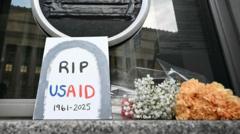Experts are sounding the alarm about the detrimental effects of the U.S. government's recent freeze on overseas aid, particularly through USAID. They predict significant health repercussions, including disease outbreaks and delays in critical vaccine development, impacting vulnerable populations across the globe.
Concerns Over U.S. Aid Freeze and its Implications for Global Health

Concerns Over U.S. Aid Freeze and its Implications for Global Health
The suspension of overseas aid by the U.S. administration raises alarms among health experts regarding the potential resurgence of diseases and delays in medical treatment initiatives.
Health experts are increasingly alarmed by the implications of the U.S. government's recent decision to freeze nearly all overseas aid distributed by the United States Agency for International Development (USAID). The Trump administration's actions, which include major staffing cuts and a comprehensive review of aid programs, have left many in the health sector worried about a looming crisis in global health systems. This freeze is anticipated to halt essential health services while permitting waivers for select humanitarian projects.
The administration's "America First" strategy has cast a cloud over USAID's operations, leading to skepticism about its funding allocations. Health professionals are stressing the importance of aid in addressing critical health challenges worldwide, as neglecting these programs could exacerbate the spread of infectious diseases, notably measles, tuberculosis, and HIV/AIDS. Dr. Tom Wingfield from the Liverpool School of Tropical Medicine argues that the negative repercussions of dismantling USAID cannot be underestimated, highlighting the integral role the agency plays in global health initiatives.
The far-reaching impact of these funding cuts has already begun to manifest, particularly for non-governmental organizations (NGOs) reliant on USAID financial support for delivering vital health services. With programs for tuberculosis, HIV treatment, and maternal care at risk, organizations like Frontline AIDS have reported widespread service disruptions and impending shortages of crucial medical supplies due to the aid freeze.
Furthermore, experts caution that delays in developing vaccines and treatments—which are often reliant on international funding sources—could lead to a resurgence of diseases previously under control. Prof. Rosa Freedman from the University of Reading warns that the freeze on funding may hinder vaccination efforts, potentially allowing preventable diseases to resurface in vulnerable communities. The ripple effect of trust erosion in these regions may also undermine long-term health initiatives as local populations react to the abrupt changes.
As the global community waits to see the long-term consequences of these drastic shifts in U.S. foreign policy, health professionals, researchers, and organizations are calling for urgent reassessment of the priorities underpinning assistance, stressing that the fate of many lives hangs in the balance.





















